Arizona

North Carolina lawmakers on Wednesday approved a bill to prohibit judges from considering “foreign laws” in their decisions, but nearly everyone agrees that “foreign laws” really means Shariah, or Islamic law.
North Carolina now joins six other states — Oklahoma, Arizona, Kansas, Louisiana, South Dakota, and Tennessee — to pass a “foreign laws” bill. A similar bill passed in Missouri, but Gov. Jay Nixon vetoed it, citing threats to international adoptions.
The bills all cite “foreign laws” because two federal courts have ruled that singling out Shariah — as Oklahoma voters originally did in 2010 — is unconstitutional.
Voters in Arizona celebrated yesterday after the Supreme Court dismissed parts of Proposition 200 — the requirement that made people of Arizona provide proof of citizenship when registering to vote. Although parts of Prop 200 remain intact, yesterday’s ruling was considered a step in the right direction for voters and immigrants across our nation. The Nation reports:
The Supreme Court defended voting rights yesterday when it struck down Arizona’s requirement to present proof of citizenship when registering to vote. But while the decision relieves registrants of an unnecessary burden, the rest of the proposition that brought it into being remains intact. Arizona’s Proposition 200 attacks not only voters but immigrants as well. Despite a win for voting rights yesterday, undocumented immigrants will remain especially vulnerable under the law.
Read more here.

On a beautiful Sunday afternoon just a few weeks ago, a friend of mine courageously crawled under a Border Patrol truck. And he wasn't changing the oil. Raúl Alcaraz Ochoa was riding his bike to work when he came upon a scene that is all too common in southern Arizona, where racial profiling by the Tucson Police Department is permitted through the notorious legislation SB1070 and Border Patrol roam our streets. Multiple police cars and Border Patrol trucks were surrounding a vehicle apparently pulled over for traffic violation. When Raúl arrived, he saw five children crying for their father and a pregnant woman sitting terrified in the vehicle. Handcuffed and being transferred to Border Patrol custody was a Latino man named René.
Raúl had to think and act quickly, and he crawled under the Border Patrol truck. He began sending texts that spread quickly throughout a community protection network designed to alert community members and advocates about raids, abuse, and racial profiling by immigration and law enforcement. Media and supporters responded within minutes, just as Raúl was pepper sprayed, Tazed, and pulled out from under the vehicle. Both men spent the night in custody, and public demands were widespread for their release. While Raúl was released the next day, top officials of Border Patrol and the Department of Homeland Security ignored pleas for René to rejoin his family, and he was promptly deported to Mexico.

One angry constituent asked repeatedly where the “dang fence” that McCain had promised was. The senator turned to a chart illustrating how much fence had been constructed (hint: it’s a lot), and the man shot back that it was not a fence. “Oh, it’s not a fence?” McCain challenged. “OK, it’s a banana. We put up a banana with about $600 million of appropriations.”
Wow. Talk about laying down the law.
McCain even alluded to the work of the faith community on changing the message on immigration. Why are we not going to deport immigrants who have been living in the country for over 40 years? “Because we are a Judeo-Christian nation,” McCain affirmed. Mass deportation is contrary to our values.

Candles burn near the bloodstained concrete sidewalk where a youth was tragically killed when more than a dozen bullets shot across the wall into the Mexican bordertown. I've walked that sidewalk running parallel to the border wall and Calle Internacional in Nogales, Sonora possibly hundreds of times. It is with this intimate awareness of the context that I describe how recent deaths in the name of homeland security are an affront to all families of the borderlands.
Four deaths in six weeks across the border region, one common offender
On the evening of Oct. 10 U.S. Border Patrol agents shot and killed 16-year old José Antonio Elena Rodriguez. The shots were fired through the paneled border wall in Nogales hitting José Antonio in the back seven-to-eight times. The agents allege the boy was involved in rock throwing. For more detailed description of the circumstances, see this article.
About a week earlier, Border Patrol agent Nicolas Ivie, 30, was killed in Naco, another Arizona border town just east of Nogales, when a fellow U.S. agent searching for smugglers mistakenly opened fire. Agent Ivie has a wife and two young daughters who live in southern Arizona, and the family is publicly fundraising to survive without him.

Today, two Christian leaders in Arizona delivered a petition signed by thousands of Christians to Gov. Jan Brewer calling on her to retract her controversial executive order denying driver’s licenses and other benefits to undocumented young people who qualify for deferred action. The petition was signed by members of the Sojourners community and reads:
We believe every person, regardless of immigration status, is created in God's image. Your recent executive order denying driver's licenses and other benefits to undocumented young people who qualify for deferred action is harsh and short-sighted. As people of faith, we urge you to reconsider your position and retract this executive order so that all God's children in Arizona can contribute to your state's economy and strengthen its communities.
Pastor Yvette Lopez of the New Life Church of God in Tucson, Ariz., also helped deliver the petition.
“I’m a conservative, but this is this was the last straw for me,” Lopez said.“This executive order is deplorable, and it must be rescinded; my faith and my politics demand this.”

President Barack Obama recently announced a policy change that would let young people living in the U.S. without immigration status pursue an education and find meaningful work without fear of deportation. As communities continue to suffer the effects of the country’s broken immigration system and families live in fear of their loved ones being deported, this was news to celebrate and an answer to prayer.
Apparently Jan Brewer, the governor of Arizona, had a different reaction to the compassion and progress embodied by this new policy. On the day it went into effect, Brewer issued an executive order denying driver’s licenses to young people in Arizona qualifying for the relief being offered by the federal government.
E-mails from former Sen. Russell Pearce purportedly reveal the motivations behind SB 1070, claims the ACLU:
"The American Civil Liberties Union of Arizona has released thousands of e-mails that it says proves Arizona's controversial immigration law was racially motivated.
The e-mails, acquired through a public records request to the state Legislature, are to and from former senator Russell Pearce, who authored Senate Bill 1070."
Read the full story HERE.

Last month, the Supreme Court struck down three of the four provisions of SB 1070, Arizona’s harsh anti-immigrant law. Now civil rights groups are going after the remaining provision—what many call, the “show me your papers” or “papers please” clause.
Of concern to these groups, along with many leaders in the faith community, is that the law will lead to people being targeted by law enforcement solely because of their race. As Luis Gutierrez (D – Ill.) explains:
"For our young C-SPAN [viewers]: Justin Bieber and Selena Gomez … have overcome their very different national origins and became apparently a happy couple. I’m sure Justin helped Gomez learn all about American customs and feel more at home in her adopted country.
"Oh wait a minute, I’m sorry," he continued. "Because I’m not a trained Arizona official, I somehow got that backwards. Actually, Ms. Gomez, of Texas, has helped Mr. Bieber, of Canada, learn all about his adopted country. Justin, when you perform in Phoenix, remember to bring your papers."

Even at 10 p.m., the dry heat caused the collapse of multiple people of faith gathered in a candlelight vigil outside Sheriff Joe Arpaio’s infamous tent city jail on Saturday evening. Earlier in the day, nearly 120 miles due south of Phoenix, the bodies of three immigrants who died of heat stroke were found. In one of those cases of tragic death, the man who collapsed was Guatemalan and his pregnant wife sat by his side.
Arizona continues to lead the way in the border humanitarian crisis and with immigrant rights violations. As a humanitarian, ally, and advocate, I came to the migrant justice movement with the belief that the U.S. immigration system and border policies were merely broken, but I am convinced now that these violations of human dignity are the symptoms of systemic racism targeted at immigrants.
The system is not broken, it is meant to break people.
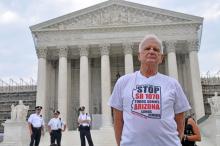
Both sides have been spinning and claiming victory in Monday’s Supreme Court ruling on Arizona’s now infamous immigration legislation SB 1070. Not surprisingly the Court ruled on the side of federal supremacy, striking down three out of four measures in the Arizona legislation, but upholding the right of local law enforcement to demand “papers” if they believe someone is undocumented.
Since the 2008 failure to move comprehensive immigration reform and last year’s disappointment on the Dream Act, the immigration reform movement has had trouble getting any “air-time” in a country that is rightfully concerned about financial recession. However, the 2012 election and a strategically placed Hispanic electorate in key swing states has candidates talking about immigration anew since the GOP primaries.
There has for some time been a larger strategy at play here that I will bluntly call “evil.”
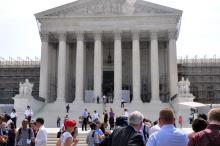
Brewer’s law had four legs. Now it has one—a lame one. The Supreme Court’s ruling was not a vindication of Brewer, rather it issued a death sentence for an unjust law. The law is not dead yet, but it may as well be a dead man walking.
Now, all eyes turn toward Congress.
Our U.S. Immigration system is still broken and something must be done. The Supreme Court has made it clear, that action must come from Congress. Now is the time for comprehensive immigration reform. Now is the time to declare, in concert with the Evangelical Immigration Table and the thousands of people who have signed the Statement of Principles for Immigration Reform, released two weeks ago today: “We call for a bipartisan solution on immigration that:
- • Respects the God-given dignity of every person
- • Protects the unity of the immediate family
- • Respects the rule of law
- • Guarantees secure national borders
- • Ensures fairness to taxpayers
- • Establishes a path toward legal status and/or citizenship for those who qualify and who wish to become permanent residents”
For CNN, Allison Brennan writes:
"After two years of protests, boycotts and lawsuits over Arizona's immigration law, Monday's Supreme Court decision leaves the state of immigration reform almost unchanged with states frustrated and Congress avoiding the debate. "I would guess [Congress] won't touch this with a 10-foot pole until after they come back after the election," Charles H. Kuck, managing partner at Kuck Immigration Partners in Atlanta, told CNN."
Read her full analysis here
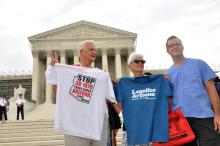
Today, as I stood on the steps of the U.S. Supreme Court eagerly following Arizona’s SB 1070 ruling, I had the opportunity to interview some advocates of the immigration reform movement.
The message that seemed to resonate among those present was that athough three of the four provisions were struck down, the fourth —the so called “show me your papers” clause — is very harmful to communities. It allows racial profiling on the basis of appearance. Even though there might be limits on how this last provision is implemented, those who feel they have the legal authority to enforce laws might feel compelled to use this piece as an excuse to discriminate.
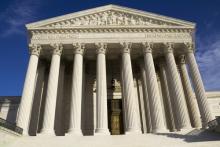
Today the Supreme Court struck down three central provisions of Arizona’s controversial anti-immigrant law, SB 1070. Attempts by Arizona to force immigrants to carry identification, create legal penalties for undocumented workers seeking employment, or detain individuals solely based on suspicions about their immigration status were ruled to interfere with the federal government’s right and responsibility to set immigration policy.
The Court let one section, known as 2(B), to stand, which allows law enforcement to check the immigration status of individuals apprehended for non-immigration offenses, if law enforcement has a “reasonable suspicion” that the person violated U.S. immigration laws in entering the country. (Read more on concerns about the racial profiling measure HERE.)
The Supreme Court on Monday struck down large portions of the controversial Arizona anti-immigrant law SB 1070.
In the decision—with Justice Sonia Sotomayor in favor—the Supreme Court struck down three major pieces of the legislation including provisions that made it illegal for immigrants to fail to carry immigration papers and a crime for undocumented immigrants to seek employment. The court also struck down the ability of police officers to arrest someone based solely on suspicion of legal status.
The most divisive provision of the law—requiring state and local police to inquire about a person's legal status when stopped in process of another offense—was upheld.
This is breaking news. Please check back for updates and analysis.
The future of Arizona’s immigration law, and by extension the laws in a number of other states modeled on it, was argued before the Supreme Court this morning. While it’s always dangerous to read too much into the questioning during the oral argument, early news reports indicate that the justices were sympathetic to the provision allowing police officers to check the immigration status of people who are arrested or otherwise detained.
According to the Associated Press:
"Liberal and conservative justices reacted skeptically to the Obama administration's argument that the state exceeded its authority when it made the records check, and another provision allowing suspected illegal immigrants to be arrested without a warrant, part of the Arizona law aimed at driving illegal immigrants elsewhere."
The Court’s decision is expected in June, and could become an important issue in the presidential election campaign.
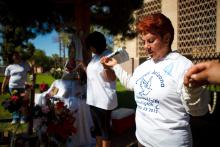
Today, the Supreme Court is hearing a case about the constitutionality of Arizona’s anti-immigrant legislation, SB 1070. It will be months before the case is decided but a broad spectrum of the Christian community already has their minds made up.
This legislation is not just ethically bankrupt but undermines basic Christian values and American ideals. The court will decide whether it is legal, but it is already clear it isn’t moral.
We are both evangelical Christians. One of us is white and one of us Hispanic. It is our common faith commitment, not the color of our skin, that unite us on the need for comprehensive immigration reform and in opposition to patchwork punitive legislation like we have seen in states like Arizona and Alabama.
My adoptive dad’s family goes back five generations in Mississippi. They endured the most ruthless lashes of American slavery and the most brutal state-sponsored terrorism during the Jim Crow legal regime. In fact, my dad personally had a brush with the Klan as a child. The Ku Klux Klan broke up an evening meeting at his grandparents’ church in the early 1950s. He doesn’t remember much about the night, except the terror. In his adult years, he looks back and realizes they were probably organizing.
Organizing… in Mississippi… before Rosa Parks said “No” in Montgomery, Ala. My grandparents were organizing.
Yet even my family history—along with images of sneering white southerners during the desegregation of Little Rock High School, complicit whites riding near-empty buses during the Montgomery bus boycott, and white officers hosing down black children in Birmingham, Alabama—did not prepare me for what I encountered when I traveled to Montgomery, Alabama, last month.
I boarded a plane in Washington, D.C., to fly to Montgomery early on December 17. There I would conduct Sojourners Organizing training for Immigration Reform in partnership with the Greater Birmingham Ministries (GBM), a faith-based organization dedicated to building more just communities and systems in Alabama.

Arizona won a significant victory last week when Russell Pearce, author of Senate Bill 1070, lost in a first-ever recall election.
It was not without great effort. I’ve since been reflecting on the lessons of the work and how we traveled from the darkness of SB1070 to the hope we feel today.
The Rev. Martin Luther King Jr. and Archbishop Oscar Romero are our heroes. They shared much in common: Both ultimately were focused on being obedient to God and his call on their lives and as such they were both, first, ministers of the Gospel. King and Romero were fixated on justice — in love with poor people and hurting communities. Both searched for middle ground while others stayed safe inside comfortable margins; both were agents of reconciliation.
And, finally, both were martyred for their message.
Yet Romero and King have a seeming discrepancy I want to explore.
Romero called us to take the long view; King discussed the fierce urgency of now.
Romero essentially prays: Trust God, be faithful. King preaches: now is the time, act forcefully.